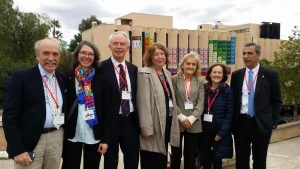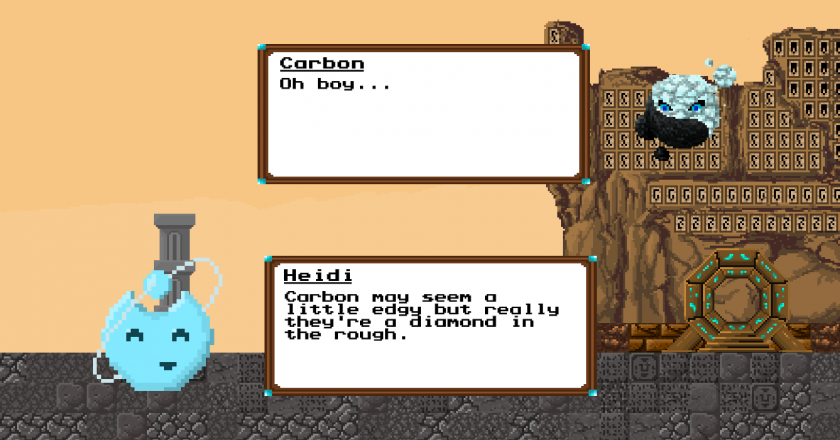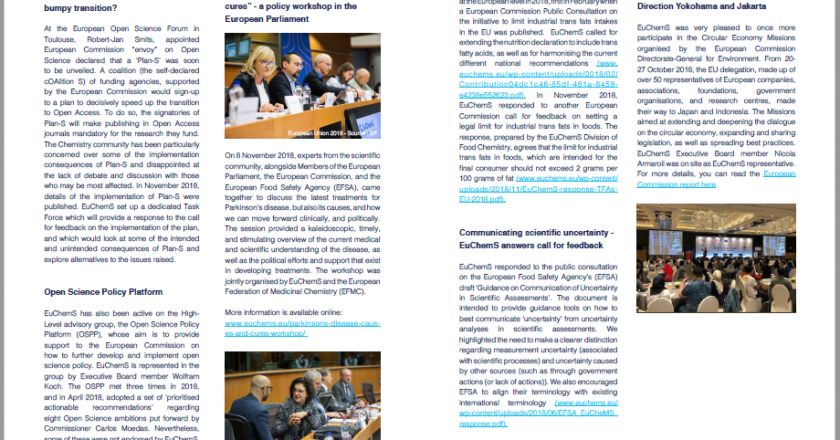Master the recipe on developing successful proposals and projects based on European Funds
Brussels, Belgium
13 – 14 March 2019
Website: http://bit.ly/2WXqR2A
17th International Conference on Chemistry and the Environment – ICCE2019
17th International Conference on Chemistry and the Environment – ICCE2019
16 – 20 June 2019
Thessaloniki, Greece
Website: https://bit.ly/2QPstIg
14th International Symposium on Macrocyclic and Supramolecular Chemistry (ISMSC2019)
14th International Symposium on Macrocyclic and Supramolecular Chemistry (ISMSC2019)
Lecce, Italy
2 – 6 June 2019
Website: http://bit.ly/2yaNa9V
37th Biennial Meeting of the Spanish Royal Society of Chemistry
37th Biennial Meeting of the Spanish Royal Society of Chemistry
San Sebastian, Spain
26 – 30 May 2019
Website: http://bit.ly/2UUxfWe
6th European Chemical Biology Symposium / Meeting of EuChemS Division “Chemistry in Life Sciences”
6th European Chemical Biology Symposium / Meeting of EuChemS Division “Chemistry in Life Sciences”
Madrid, Spain
3 – 5 April 2019
Website: http://bit.ly/2E7ojHD
1st GHI World Congress on Food Safety and Security (GHI2019)
1st GHI World Congress on Food Safety and Security (GHI2019)
Leiden, Netherlands
24 – 28 March 2019
Website: http://bit.ly/2PrzhL8
Chemical Sciences for Horizon Europe, education and employability
Chemical Sciences for Horizon Europe, education and employability
Brussels, Belgium
7 March 2019
Website: bit.ly/ChemEm7-3-19
Horizon 2020: Safety Research and Innovation for advanced nuclear systems
Advanced nuclear systems for increased sustainability and first Generation-IV reactors are expected to be fully operational around the world in coming decades. In the meantime, all new concepts and designs currently under development, both in Europe and worldwide, will need to demonstrate compliance with evolving and ever more stringent safety requirements. In this context, a significant increase in the level of safety is expected to be demonstrated. Advanced designs should show increased resilience to severe accidents, while also offering major advantages in terms of one or more of: use of uranium resource, reduction of high-level waste production and increased proliferation resistance.
Planned Opening date: 15 May 2019
Deadline: 25 September 2019
Website: http://bit.ly/2GAJTWu
Horizon 2020: Converting Sunlight to storable chemical energy
To replace fossil energy with sustainable alternatives that provide the same flexibility and convenience of use, we need to store sustainable energy on a large scale and for a long time in new kind of energy storage compounds. This can be done by direct conversion of sunlight into storable chemicals that can be stored for a virtually unlimited time. At present, these processes can be performed at the level of small prototype devices at high cost. Therefore, research and innovation are needed to bring these approaches from infancy to maturity. The production of clean forms of storable chemical energy from direct sunlight is the next step.
Planned Opening date: 7 May 2019
Deadline: 27 August 2019
Website: http://bit.ly/2WXRLHt
Public consultation: Evaluation of the feed additives Regulation
Public consultation: Evaluation of the feed additives Regulation
The European Commission has launched a public consultation on the Evaluation and Fitness Check Roadmap on the feed additives Regulation.
Drop us a line if you would like to contribute to an EuChemS response! Deadline to send us feedback: 20 March 2019.
Call for feedback: High and low Indirect Land-Use Change (ILUC) – risks biofuels, bioliquids and biomass fuels
Call for feedback: High and low Indirect Land-Use Change (ILUC) – risks biofuels, bioliquids and biomass fuels
The European Commission has launched a call for feedback on the delegated regulation on High and low Indirect Land-Use Change (ILUC) – risks biofuels, bioliquids and biomass fuels.
Drop us a line if you would like to contribute to an EuChemS response! Deadline to send us feedback: 25 February 2019.
Members of the European Parliament warn of ‘snail pace on pesticide innovation’
On 13 February, Members of the European Parliament overwhelmingly voted in favour of a non-binding resolution stating that EU Member States are failing to switch from chemical pesticides towards low-risk alternatives, despite it being required under EU law. The Parliament in turn called on the European Commission and Member States to meet their obligations.
With worries over the use of pesticides and their impact on biodiversity in Europe, the Parliament has stressed the need to make significant progress in promoting and incentivising innovation and the development of low-risk or non-chemical alternatives.
The European Commission has been called on to propose an EU-wide binding target for the reduction of pesticide use, as well as immediate bans on the use of pesticides that are at a certain distance from residential areas, schools, nurseries and hospitals.
Join us for our upcoming event!
On 7 March, EuChemS will be holding a workshop in the European Parliament in Brussels, where, together with representatives from the EU institutions, academia and industry, the state of education, employability and opportunities in Horizon Europe for the chemical sciences will be discussed and debated. The workshop will explore the meaning behind the figures of the 2nd Employability Survey of European Chemists, such as gender imbalance, acquired versus needed skills, the need to bring academia and industry closer together, and funding opportunities through Horizon Europe. The event is free to join, simply register online here, where you can also consult the programme and list of speakers. Register before 22 February!

Women and the Periodic Table
The International Year of the Periodic Table has also provided an opportunity to discuss one of the rarely mentioned aspects of the Periodic Table: the women  behind it. Shedding light on the role of women in science and in the discovery of elements is vital to better understand the lingering gender disparity, and how history has generally turned a blind eye to their plight. On 12 February, a Global Women’s Breakfast, spearheaded by IUPAC took place, with women scientists across the world coming together to celebrate women in science. EuChemS President Pilar Goya participated in the Global Breakfast in Murcia during the two-day international symposium on ‘’Setting their Table: Women and the Periodic Table of Elements’’.
behind it. Shedding light on the role of women in science and in the discovery of elements is vital to better understand the lingering gender disparity, and how history has generally turned a blind eye to their plight. On 12 February, a Global Women’s Breakfast, spearheaded by IUPAC took place, with women scientists across the world coming together to celebrate women in science. EuChemS President Pilar Goya participated in the Global Breakfast in Murcia during the two-day international symposium on ‘’Setting their Table: Women and the Periodic Table of Elements’’.
Speakers at the event included Brigitte Van Tiggelen, Chair of the EuChemS Working Party on the History of Chemistry who is currently preparing a book on women and the periodic table, an EuChemS initiative for the IYPT2019. Marta Kucza from the EuChemS Secretariat presented a unique perspective on women in science through anthropological lenses. 
Science week in the European Parliament
 Last week saw the European Parliament dedicate a series of high-level events on science, and more precisely the need to ensure science and policy are more actively and efficiently intertwined. Through talks, but also interactive group sessions, participants had the opportunity of seeing the importance science communication plays in shaping political discourses. The rising distrust in scientific advice and of ‘experts’ was also a major focus, with discussions concentrated on how to counter this changing landscape. Member of the European Parliament Paul Rübig also praised the MEP-scientist pairing scheme as a successful way of bringing science and policy closer together. EuChemS can testify to this, having in the past taken part. Nevertheless, with only a handful of MEPs signing up to the scheme, its impact is limited.
Last week saw the European Parliament dedicate a series of high-level events on science, and more precisely the need to ensure science and policy are more actively and efficiently intertwined. Through talks, but also interactive group sessions, participants had the opportunity of seeing the importance science communication plays in shaping political discourses. The rising distrust in scientific advice and of ‘experts’ was also a major focus, with discussions concentrated on how to counter this changing landscape. Member of the European Parliament Paul Rübig also praised the MEP-scientist pairing scheme as a successful way of bringing science and policy closer together. EuChemS can testify to this, having in the past taken part. Nevertheless, with only a handful of MEPs signing up to the scheme, its impact is limited.
When international collaboration creates Chemistry
With no clear end in sight in Brexit negotiations, the impact on scientific collaboration, funding, and mobility between the UK and the rest of the EU remains largely unclear. Moreover, trialogue negotiations between the European Council, European Parliament, and the European Commission are moving forward, meaning that the future research framework programme, Horizon Europe, is aimed at being finalised in the coming months.
In August 2018, EuChemS published its Position Paper on Horizon Europe, stating that the programme should enable countries that had previously participated in EU research framework programmes (such as Horizon2020) be allowed to do so in the future. More recently, EuChemS Member Society the Royal Society of Chemistry (RSC), published a short report which looks at the benefits of international collaboration. The report draws on the key findings of 10 in-depth case studies with chemical researchers and entrepreneurs in the UK and in Europe. The conclusion? International collaboration creates better and more impactful science.
Read the full story here.
ECHA submits proposal for ban on microplastics
ECHA, the European Chemicals Agency, submitted on 30 January an official proposal to restrict microplastic particles that are intentionally added to mixtures used by consumers or professionals. ECHA believes that if the restriction is adopted, the amount of microplastics released in the environment in the EU would drop by some 400 thousand tonnes over 20 years.
Intentionally created microplastics represent between 15-31% of all microplastics found in the oceans. The other sources of microplastics, also known as secondary microplastics originate from the degradation of larger plastic objects (bottles, bags…).
In September 2018, the European Parliament approved a plastics strategy which aims to increase the recycling rate of plastic waste in the EU, as well as an EU ban on certain single-use plastic products. They furthermore called on the European Commission to introduce an EU-wide ban on intentionally added microplastics in products such as cosmetics and detergents.

‘Elemental Escapades!’: the new EuChemS video game
Transported to an alien world where everything looks unfamiliar, Jan is asked to help find missing elements and use their properties to create compounds in order to find a way out and escape. Join the adventure where you can learn simple chemistry through EuChemS’ new video game ‘Elemental Escapades!’. Developed to provide an entertaining means of learning chemistry, the video game is a project created in light of the International Year of the Periodic Table. Download and play the game here!
The #IYPT2019, the Periodic Table and EuChemS

On 22 January, the EuChemS Periodic Table was unveiled by EuChemS President Pilar Goya and MEP Catherine Stihler alongside the oldest known wallchart of the Periodic Table at an event in the European Parliament.
With speakers from the scientific community and from the European Parliament and the European Commission, participants were delivered an outstanding talk, encompassing issues such as element scarcity, EU-led actions in the area, elements at the deep-sea level, the meaning and importance of the International Year of the Periodic Table (IYPT2019), as well as the exhilarating discovery of the Periodic Table wallchart in Saint Andrews.
It was all the more encouraging to see a wide variety of participants attend the event, from representatives from chemical societies, EU institutions, advocacy groups, and a class of some 25 pupils from the European School of Brussels.
We were particularly pleased to see the event and the Periodic Table picked up in news outlets across the world, from the UK to Australia. Listen to David Cole-Hamilton on BBC world, and take a look at this informative article in The Guardian.
Presentations for the event are available online here.

Celebrations for the IYPT2019 truly kicked off on 29 January at the UNESCO offices in Paris, where some 700 participants from across the world came together for a series of talks from leading scientists, along with an entertaining and informative exhibition area. A delegation of EuChemS members were present, along with EuChemS President Pilar Goya, and the secretariat. On display was the Periodic Table depicting element scarcity – which in turn was put in the spotlight by famous YouTuber Sir Martyn Poliakoff during his presentation on the Periodic Tables to be found in his office.
Speakers also included UNESCO Director-General Audrey Azoulay, Chemistry Nobel Laureate Ben Feringa, and Yuri Oganessian, pioneer in the discovery of super-heavy elements.
The event, mixing entertaining and accessible talks with crucial and complex presentations on scientific developments, together with a chemistry bar to unwind, was a great taster of what the year ahead has planned for us.

Year Book 2018 published
EuChemS has published the 2018 Year Book, offering a summary of the many activities and initiatives of 2018. The annual overview includes an editorial by EuChemS President Pilar Goya, as well as insights into EuChemS’ policy actions, recognised events, awards, and Professional Networks. Take a look for a complete insight into the many activities EuChemS has taken part in!
The Year Book is now available for download online.
EuChemS issues statement on the implementation guidelines of Plan S and attends latest OSPP meeting
EuChemS has issued a Position Paper on the implementation guidelines of Plan S.
On 4 September 2018, ‘cOAlition S’, a coalition of national research funders, supported by the European Commission, launched ‘Plan S’, an initiative to accelerate the transition to open access in scientific publishing. Currently, several national funding bodies in Europe have committed to Plan S, others have not. The plan consists of 10 principles for the transition to Open Access and more specific implementation guidelines were published by cOAlitionS on 27 November 2018.
“EuChemS supports the transition to Open Access (OA) in scientific publishing. Access to research and dissemination of knowledge is a fundamental purpose of our community’s values and aims. As a representative for research chemists and chemical societies across Europe, we welcome the conversation and the debate that this has engendered and look forward to working together with all stakeholders on finding sustainable solutions that secure the interests of researchers, societies, funders, librarians and publishers involved in the important task of disseminating scientific research.
Although the implementation guidelines provide some clarifications, we believe the consequences of Plan S remain unclear and could undermine the visibility and vitality of European research on a global stage if not properly implemented.”
On 29 January, EuChemS attended the High-Level Open Science Policy Platform (OSPP) meeting in the European Parliament, with discussions touching upon indicators for research engagement, and the role of rewards and incentives. The OSPP is a high-level group tasked with providing feedback and guidance to the European Commission on the implementation of Open Science in Europe. EuChemS is represented in the group by Executive Board Member Wolfram Koch.
Raw Materials and Environment 2019
Raw Materials and Environment 2019
19 – 20 February 2019
Berlin, Germany
Website: https://www.umweltbundesamt.de/en/raw-materials-environment-2019-start
Science meets Parliaments: What role for science in the 21st century policy-making
Science meets Parliaments: What role for science in the 21st century policy-making
6 – 7 February 2019
Brussels, Belgium
Website: https://ec.europa.eu/jrc/en/event/conference/science-meets-parliaments-2019
International R&D: Horizon Europe and the world
International R&D: Horizon Europe and the world
5 February 2019
Brussels, Belgium
Website: https://sciencebusiness.net/events/international-rd-horizon-europe-and-world
Food Safety in the EU: Maintaining High Standards and Ensuring Transparency of Information
Food Safety in the EU: Maintaining High Standards and Ensuring Transparency of Information
29 January 2019
Brussels, Belgium
Website: http://www.publicpolicyexchange.co.uk/events/JA29-PPE1

You must be logged in to post a comment.